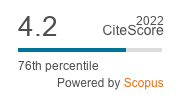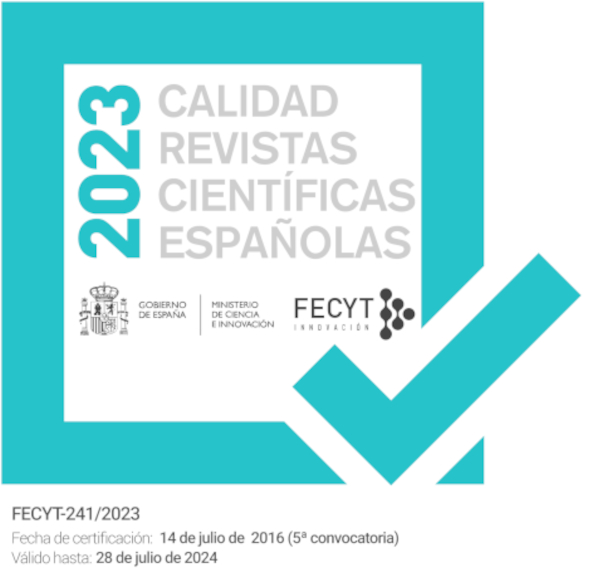Consensus on human driving factors of climate change has not been demonstrated yet
DOI:
https://doi.org/10.18172/cig.3368Keywords:
climate change, consensus, science, majority, post-truthAbstract
During the last three decades two new paradigms have emerged. The first one in the called “Climate Change”, and the second, that could be named scientific-social paradigm, and referred to the previous, is the consensus that climate change has been produced by human emissions.
In this paper, after a brief presentation of the first paradigm following the main conclusions of IPCC, the author reviews the main documents from which the second one has been stated. It is not the aim of this paper to argue or discuss the climate change and its attribution, but how the consensus has been achieved, because the consensus on the attribution of climate change is apparent, since it cannot be concluded from the aforementioned text.
The review of the most well-known and quoted papers in scientific, political, cultural, and mass media, shows that 97% magnitude of consensus is not related to the original data, it has been calculated from partial slanted and biased information, and is referred to the opinion of a small number of people. With caution, the most real agreement from the data published until present should be approximately 50%.
Temperature has risen from the beginning of surface observations, but there is not necessary any consensus to support this empirical fact. Meanwhile, to attribute that greenhouse gases emission is the most relevant factor based on majority or authority principles is not scientifically correct, because no one polling has been proof of true.Downloads
References
Allen, M. 2011. In defence of the traditional null hypothesis: remarks on the Trenberth and Curry WIREs opinion articles. WIREs Climate Change 2, 931-934. http://doi.org/10.1002/wcc.145.
Allison, D., Brown, A.W., George, B.J., Kaiser, K.A. 2016. Mistakes in peer-reviewed papers are easy to find but hard to fix. Nature 530, 27-29. http://doi.org/10.1038/530027a.
Anderegg, W.R.L., Prall, J.W., Harold, J., Schneider, S.H. 2010. Expert credibility in climate change. Proceedings of the National Academy of Sciences 107, 12107-12109.
Aarstad, J. 2010. Expert credibility and truth. Proceedings of the National Academy of Sciences 107, 47. http://doi.org/10.1073/pnas.1012156107.
Bast, J.L. 2013. AMS Survey shows no consensus on Global Warming. Policy Brief. The Heartland Institute, November, 28.
Bedford, D. 2010. Agnotology as a teaching tool: Learning climate science by studying misinformation. Journal of Geography 109, 159-165. http://doi.org/10.1080/00221341.201 0.498121.
Bedford, D., Cook, J. 2013. Agnotology, scientific consensus, and the teaching and learning of climate change: A response to Legates, Soon and Briggs. Science & Education 22, 2019- 2030.
Benestad, R.E., Hygen, H.P., Dorland, R. van, Cook, J., Nuccitelli, D. 2013. Agnotology: learning from mistakes. Earth Science Dynamics Discussion 4, 451-505. https://doi.org/10.5194/ esdd-4-451-2013.
Biddle, J.B., Leuschner, A. 2015 Climate skepticism and the manufacture of doubt: can dissent in science be epistemically detrimental? European Journal for Philosophy of Science 5, 261- 278.
Bodestein, L. 2010. Regarding Anderegg et al. and climate change credibility. Proceedings of the National Academy of Sciences 107, 52. http://doi.org/10.1073/pnas.1013268108.
Bray, D., von Storch, H. 2013. A survey of the perceptions of climate scientists 2013. Helmholtz Zentrum Geesthacht Geestacht, Germany.
Carlton, J.S., Perry-Hill, R., Huber, M., Prokopy, L.S. 2015. The climate change consensus extends beyond climate scientists. Environmental Research Letters 10, 094025. http://doi. org/10.1088/1784-9326/10/9/094025.
Christy, J.R. 2016. U.S. House Committee on Science, Space & Technology. 2 Feb 2016. http://docs.house.gov/meetings/SY/SY00/20160202/104399/HHRG-114-SY00-Wstate- ChristyJ-20160202.pdf.
Cook, J., Nuccitelli, D., Green, S.A., Richardson, M., Winkler, B., Painting, R., Way, R., Jacobs, P., Skuce, A. 2013. Quantifying the consensus on anthropogenic global warming in the scientific literature. Environmental Research Letters 8, 024024. http://doi.org/10.1088/1748- 9326/8/2/024024.
Cook, J., Nuccitelli, D., Skuce, A., Jacobs, P., Painting, R., Honeycutt, R., Green, S.A., Lewandowsky, S., Richardson, M., Way, R.G. 2014. Reply to Quantifying the consensus on anthropogenic global warming in the scientific literature: a re-analysis. Energy Policy 73, 706-708. https://doi.org/10.1016/j.enpol.2014.06.002.
Cook, J., Cowtan, K. 2015. Reply to Comment on ‘Quantifying the consensus on anthropogenic global warming in the scientific literature’. Environmental Research Letters 10, 039002.
Cook, J., Oreskes, N., Doran, P., Anderegg, W.R.L., Verheggen, B., Maibach, E.W., Carlton, J.S., Lewandowsky, S., Skuce, A.G., Green, S.A., Nuccitelli, D., Jacobs, P., Richardson, M., Winkler, B., Painting, R., Rice, K. 2016. Consensus on Consensus: A Synthesis of Consensus Estimates on Human- caused Global Warming. Environmental Research Letters 11, 048002.
Curry, J. 2011. Nullifying the climate null hypothesis. WIREs Climate Change 2, 919-924. http:// doi.org/10.1002/wcc.141.
Curry, J. 2015. State of the climate debate in the U.S. Remarks to U.K. House of Lords. 15 Junio. https://judithcurry.com/2015/06/15/state-of-the-climate-debate-in-the-u-s/.
Curry, J. 2017. Climate models for the layman. The Global Warming Policy Fundation, Briefing 24. https://www.thegwpf.org/content/uploads/2017/02/Curry-2017.pdf.
Dean, B.J.F. 2015. Comment on ‘Quantifying the consensus on anthropogenic global warming in the scientific literature’ Environmental Research Letters 10 039001.
Doran, P.T., Zimmerman, M.K. 2009. Examining the scientific consensus on climate change. EOS 90, 22-23. http://doi.org/10.1029/2009EO030002.
Duarte, J.L. 2014. Comment on ‘scientists’ views about attribution of global warming’ Enviromental. Science Technology 48, 14057-14058. http://doi.org/10.1021/es504574v.
Engqvist, L., Frommen, J.G. 2008. The h-index and self citation. Trends in Ecology and Evolution 23, 250-252. http://doi.org/10.1016/j.tree.2008.01.009.
Friends of Science Society. 2014. 97% Consensus? No! Global warming math, myth & social proofs. Friends of Science Society, Calgary, Canadá, 50 pp. Disponible en: https://www. friendsofscience.org/assets/documents/97_Consensus_Myth.pdf.
Granqvist, R. 2009. Comment on “examining the scientific consensus on climate change”. EOS 90, 27. http://doi.org/10.1029/2009EO270008.
Harari, Y.N. 2016. Homo Deus. Breve historia del mañana. Ed Debate, ISBN: 9788499924212.
Harlos, C., Edgell, T.C., Hollander, J. 2017. No evidence of publication bias in climate change science. Climatic Change 140, 375-385. http://doi.org/10.1007/s10584-016-1880-1.
Harde, H. (2014). Advanced two-layer climate model for the assessment of global warming by CO2. Open Journal of Atmospheric and Climate Change 1, 2374-3794. http://doi.org/10.15764/ ACC.2014.03001.
Helsdon, J. 2009. Further comment on “Examining the scientific consensus on climate change”. EOS 90, 27. http://doi.org/10.1029/2009EO270009.
Houston, J.R., Dean, R.G. 2011. Sea-level acceleration based on U.S. tide gauges and extensions of previous global-gauge analyses. Journal of Coastal Research 27, 409-417. https://doi. org/10.2112/JCOASTRES-D-10-00157.1.
Idso, C.D., Carter, R.M., Singer, S.F. 2015. Why scientists disagree about global warming. The Heartland Institute Arlington Heights, Illinois, 122 pp.
IPCC. 2013. Summary for policymakers. In: Climate Change 2013: The physical science basis. In: T.F. Stocker et al. (Eds.) Contribution of Working Group I to the Fifth Assessment Report of the IPCC. Cambridge University Press, Cambridge.
Kahan, D.M., Jenkins-Smith, H, Braman, D. 2011. Cultural cognition of scientific consensus. Journal of Risk Research 14, 147-174. http://doi.org/10.1080/13669877.2010.511246.
Kahan, D.M. 2015. Climate-science communication and the measurement problem. Political Psychology 36, 1-43. http://doi.org/10.1111/pops.12244.
Lafambroise, D. 2016. Peer review. Why skepticism is essential. The Global Warming Policy Foundation Report 20. ISBN 978-0-9931189-3-7.
Lainer, L. (Dir.). 2015. An elaboration of AAAS Scientific´s views. A deeper examination of views about key science topics by members of the American Association for Advance Science. Pew Research Center, 48 pp. Disponible en: http://www.pewinternet.org/packages/science-and-society/.
Legates, D.R., Soon, W., Briggs, W.M., Monckton of Brenchley, C. 2013a. Learning and teaching climate science: the perils of consensus knowledge using agnotology. Science & Education 22, 2007-2017. http://doi.org/10.1007/s11191-013-95883.
Legates, D.R., Soon, W., Briggs, W.M., Monckton of Brenchley, C. 2013b. Climate consensus and ‘misinformation’: a rejoinder to agnotology, scientific consensus, and the teaching and learning of climate change. Science & Education 24, 299-318. http://doi.org/10.1007/ s11191-013-9647-9.
Lefsrud, L.M., Meyer, R.E. 2012. Science or Science Fiction? Professionals’ discursive construction of climate change. Organization Studies 33, 1477-1506. http://doi. org/10.1177/0170840612463317.
Lewandowsky, S., Oberauer, K., Gignac, G.E. 2013. NASA Faked the Moon landing—Therefore, (climate) science is a hoax: An anatomy of the motivated rejection of science. Psychological Science 245, 622-633. http://doi.org/10.1177/0956797612457686.
Lewandowsky, S., Cook, J., Lloyd, E. 2016. The ‘Alice in Wonderland’ mechanics of the rejection of (climate) science: simulating coherence by conspiracism. Synthese. http://doi.org/10.1007/ s11229-016-1198-6.
Lindzen, R. 2012. Climate Science: Is it currently designed to answer questions? Euresis 2, 161- 193.
Liu, X., Vedlitz, A., Stoutenborough, J.W., Robinson, S. 2015. Scientists’ views and positions on global warming and climate change: A content analysis of congressional testimonies. Climatic Change 131, 487-503. http://doi.org/10.1007/s10584-015-1390-6.
Losh, S.C. 2016. Agreement among environmental scientists: higher than previously thought. Bulletin of Science, Technology & Society 1-6. http://doi.org/10.1177/0270467616634958.
Lovelock, J. 2008. La venganza de la Tierra. Planeta, 268 pp.
Luening, S., Vahrenholt, F. 2017. Medieval Warning Project Map. Disponible en: http://t1p.de/ mwpdownloaded (consulta 27/08/2017).
Maibach, E., Stenhouse, N., Cobb, S., Ban, R., Bleistein, A. et al. 2012. American Meteorological Society member survey on global warming: Preliminary findings (February 12). Fairfax, VA: Center for Climate Change Communication. Disponible en : http://climate.gmu.edu.
Merton, R.K. 1968. The Matthew effect in science. Science 159, 56-63. http://doi.org/10.1126/ science.159.3810.56.
O´Neil, S.J., Boykoff, M. 2010. Climate denier, skeptic, or contrarian?. PNAS 107, 39 E1S1. http:// doi.org/10.1073/pnas.1010507107.
Oreskes, N. 2004. Beyond the ivory tower: the scientific consensus on climate change. Science 306, 5702. http://doi.org/10.1126/science.1103618.
Peiser, B. 2005. The letter science magazine rejected. Energy and Environment 16, 685-688. http:// doi.org/10.1260/0958305054672330.
Petit, J.R., Jouzel, J., Raynaud, D., Barkov, N.I., Barnola, J.M., Basile, I., Bender, M., Chappellaz, J., Davis, M., Delaygue, G., Delmotte, M., Kotlyakov, V.M., Legrand, M., Lipenkov, V.Y., Lorius, C., Pépin, L., Ritz, C., Saltzman, E., Stievenard, M. 1999. Climate and atmospheric history of the past 420,000 years from the Vostok ice core, Antarctica. Nature 399, 429-436. http://doi.org/10.1038/20859.
Pielke, R. Sr., Beven, K., Brasseur, G., Calvert, J., Chahine, M., Dickerson, R.R., Entekhabi, D., Foufoula-Georgiou, E., Gupta, H., Gupta, V., Krajewski, W., Krider, E.P., Lau, W.K.M., McDonnell, J., Rossow, W., Schaake, J., Smith, J., Sorooshian, S., Wood, E. 2009. Climate Change: The need to consider human forcings besides greenhouse gases. EOS 90, 10. http:// doi.org/10.1029/2009EO450008.
Powell, J. 2014. Climate Scientists Virtually Unanimous: Anthropogenic Global Warming Is True. Bulletin of Science, Technology & Society 1-6. http://doi.org/10.1177/0270467616634958.
Pew Research Center (PRC) (2015) An elaboration of AAAS Scientists ‘views. A deeper examination of views about key science topics by members of the American Association for the advancement of Science. In: L. Rainie (Dir.), 48 pp. Disponible en: http://www. pewinternet.org/packages/science-and-society/.
Rapp, D. 2014. Assessing Climate Change. Springer, 3ª ed., 816 pp.
Rosenberg, S., Vedlitz, A., Cowman, D., Zahran, S. 2010. Climate Change: A Profile of U.S. Climate Scientists’ Perspectives. Institute for Science, Technology and Public Policy, Bush School of Government and Public Service, Texas A&M University, 20 p. (Consultado en su version original, publicado posteriormente en Climatic Change 101, 311-329).
Schulte, K-M. 2008. Scientific consensus on climate change? Energy & Environment 19, 281-286.
Stenhouse, N., Maibach, E., Cobb, S., Ban, R., Bleistein, A., Croft, P., Bierly, E., Seitter, K., Rasmussen, G., Leiserowitz, A. 2014. Meteorologists’ views about global warming: A survey of American Meteorological Society professional members. Bulletin of the American Meteorological Society 95, 1029-1040. https://doi.org/10.1175.BAMS-D-13-00091.1.
Strengers, B., Verheggen, B., Vringer, K. 2015. Climate science survey. Questions and responses. PBL Netherlands Environmental Assessment Agency, 39 p.
Tol, R.S.J. 2014a. Quantifying the consensus on anthropogenic global warming in the literature: a re-analysis. Energy Policy 73, 701-705.
Tol, R.S.J. 2014b. Quantifying the consensus on anthropogenic global warming in the literature: rejoinder. Energy Policy 73, 709. https://doi.org/10.1016/j.enpol.2014.04.045.
Tol, R.S.J. 2016. Comment on ‘Quantifying the consensus on anthropogenic global warming in the scientific literature’. Environmental Research Letters 11, 048001.
Trenberth, K.E. 2011. Attribution of climate variations and trends to human influences and natural variability. WIREs Climate Change 2, 925-930. http://doi.org/10.1002/wcc.142.
Verheggen, B., Strengers, B., Cook, J. van Dorland, R., Vringer, K., Peters, J. Visser, H., Meyer, L. 2014. Scientists’ views about attribution of global warming. Environmental Science & Technology 48, 8963-8971. http://doi.org/10.1021/es501998e.
Downloads
Published
How to Cite
Issue
Section
License
The authors retain copyright of articles and authorize Cuadernos de Investigación Geográfica / Geographical Research Letters the first publication. They are free to share and redistribute the article without obtaining permission from the publisher as long as they give appropriate credit to the editor and the journal.
Self-archiving is allowed too. In fact, it is recommendable to deposit a PDF version of the paper in academic and/or institutional repositories.
It is recommended to include the DOI number.
This journal is licensed under a Creative Commons Attribution 4.0 International License











